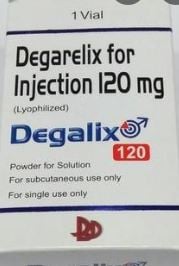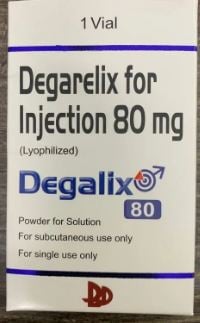Apatide 60mg Tablet 120s APALUTAMIDE
Introduction to Apatide 60mg Tablet 120s
Apatide 60mg Tablet 120s is a medication in tablet form primarily used to treat prostate cancer. Specifically, it targets non-metastatic castration-resistant prostate cancer, a type of prostate cancer that hasn't spread and doesn't respond to hormone therapy.
Composition of Apatide 60mg Tablet 120s
The active ingredient in Apatide 60mg Tablet 120s is Apalutamide. Apalutamide works by blocking androgen receptors, which are proteins that male hormones bind to, preventing them from stimulating cancer cell growth.
Uses of Apatide 60mg Tablet 120s
- Treatment of non-metastatic castration-resistant prostate cancer
Side effects of Apatide 60mg Tablet 120s
- Common side effects: Fatigue (feeling very tired), Hypertension (high blood pressure)
- Serious side effects: Increased risk of falls and fractures due to dizziness
Precautions of Apatide 60mg Tablet 120s
Apalutamide can increase the risk of falls and fractures due to dizziness. It should not be used if allergic to it or if there's a history of seizures, which are sudden, uncontrolled electrical disturbances in the brain.
How to Take Apatide 60mg Tablet 120s
The usual starting dose of Apatide 60mg Tablet 120s for adults is 240 mg taken once daily, usually in the morning, with or without food. Follow your doctor’s advice for the correct way to use your prescribed form.
Conclusion of Apatide 60mg Tablet 120s
Apatide 60mg Tablet 120s, containing the active ingredient Apalutamide, belongs to the therapeutic class of anti-androgens. It is primarily used for treating non-metastatic castration-resistant prostate cancer. Manufactured with precision, this medication is essential for patients with specific prostate cancer conditions. Always consult your healthcare provider for personalized advice and guidance on using Apatide 60mg Tablet 120s.


How to take Abiron?
Abiron should be taken on an empty stomach with water 1 hour before eating or at least 2 hours after eating. Taking it with food may cause increased and variable levels of Abiron in your blood which can be harmful. Remember not to crush or chew the tablet.

Is Bortemap FDA approved?
Yes, Bortemap is approved by FDA

Is Platin light sensitive?
Yes Platin is highly sensitive to light and it is absolutely crucial to store it in the appropriate manner to ensure its integrity and efficacy Exposure to light can have detrimental effects on the chemical properties and stability of Platin potentially rendering it ineffective or even causing it to deteriorate Therefore it is essential to take proper precautions when handling and storing Platin to maintain its quality To safeguard Platin from light degradation it should be stored in a dark and cool environment preferably in an airtight container that offers protection against any form of light exposure It is advisable to store Platin away from direct sunlight as well as fluorescent or other artificial lighting sources Additionally it is important to avoid storing Platin in areas that have high humidity or fluctuating temperatures as these conditions can further degrade its composition Properly storing Platin not only helps maintain its efficacy but also extends its shelf life ensuring that it remains potent and effective for its intended use By safeguarding Platin from light sensitivity its chemical integrity is preserved and its therapeutic benefits can be maximized Hence adhering to proper storage guidelines is of utmost importance to ensure the optimal performance of Platin

I have noticed some changes in my skin after taking Lagicad 5000IU Injection. What should I do?
Use a moisturizer to get relief from rashes, dry, and itchy skin during the treatment. Avoid sun exposure. Wear SPF 30 (or higher) sunblock and protective clothing. However, if you develop yellow discoloration of your skin, inform your doctor immediately as this could be a sign of a liver problem.

Is Carbotinal vesicant/cardio-toxic/ anthracycline?
No Carbotinal is not cardiotoxic anthracycline or a vesicant These terms refer to the potential harmful effects of certain substances on the heart their use in chemotherapy or their ability to cause tissue damage upon contact respectively Carbotinal on the other hand is not associated with any of these characteristics Carbotinal is a pharmaceutical compound that is generally regarded as safe and welltolerated when used as prescribed It is commonly used in the treatment of various medical conditions such as respiratory infections skin conditions and urinary tract infections Its mechanism of action involves inhibiting the growth and replication of bacteria therefore helping to alleviate the symptoms associated with these infections It is important to note that while Carbotinal may have potential side effects such as gastrointestinal disturbances or allergic reactions these are typically rare and mild in nature As with any medication it is always advisable to consult with a healthcare professional before starting or modifying any treatment regimen They can provide the necessary guidance and monitor any potential risks associated with the use of Carbotinal ensuring the best possible outcome for the patient

How does Bortiad work?
Bortiad belongs to the class of drugs called a proteasome inhibitor. It acts by blocking the action of proteasome, and affects the growth of cancerous (actively growing) cells











.svg)
